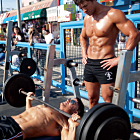 What’s the most important meal of the day? If you answered, “Breakfast,” then you need to take a remedial course in sports nutrition.
What’s the most important meal of the day? If you answered, “Breakfast,” then you need to take a remedial course in sports nutrition.
The classic work by Paul Cribb, Ph.D., showed that taking the identical supplement—protein, carbs and creatine—before and after exercise was more effective in promoting gains in muscle and strength than taking it in the morning and evening.1 Clearly, timing matters!
Even so, I find it amusing that many arm-chair experts expound in their inane blogs about how several studies show no effect of nutrient timing—meaning that there are some studies in which consuming a protein-and-carb or whatever combination supplement around the peri-workout window is no better than just eating your regular meals. To that I say no sh#$.
If you’re looking for unanimous agreement of data showing that any strategy works 100 percent of the time, the field of scientific inquiry isn’t for you. Instead, join a monastery, where absolute truth is taught. Heck, there are studies showing that creatine doesn’t always have an ergogenic effect. Does that mean you shouldn’t take it?
What is clear is that consuming nutrients around the peri-workout window either helps tremendously or has a neutral effect. If you have half a brain, it makes perfect sense to take advantage of the “nutrient timing” window because there really is no downside.
Now here’s a twist. Data presented at the 10th Annual ISSN Conference in Colorado Springs, Colorado, on June 14 and 15 showed that taking in creatine after exercise may be better for you than getting it before exercise. Either way, creatine is great to take if your goal is lean body mass gains and strength increases. This study, which was performed at Nova Southeastern University in Davie, Florida, showed that recreational bodybuilders put on more lean body mass (4.4 pounds vs. 2.0 pounds) and got stronger on the bench press (16.7 pounds vs. 14.5 pounds) if they took in creatine post-training vs. pretraining. Keep in mind that these aren’t the typical fat slobs you see in many published studies. They were already in tremendous shape, and so any change in body composition or strength would be difficult to effect.
Does that mean that taking creatine preworkout is a waste of time? Hardly. As the study was only one month long, perhaps just taking creatine continually over the course of months or years would negate any short-term effect involving timing. Nevertheless, this study does indicate that timing matters. Does it work for everybody all the time? Does anything work for everybody all the time? Exactly. Be a pragmatist. Take advantage of nutrient timing. The only downside is, well, nothing.
—Jose Antonio, Ph.D.
Editor’s note: Jose Antonio, Ph.D., is an assistant professor at Nova Southeastern University in sunny South Florida.
1 Cribb, P. J., and Hayes, A. (2006). Effects of supplement timing and resistance exercise on skeletal muscle hypertrophy. Med Sci Sports Exerc. 38:1918-1925.




















You must be logged in to post a comment Login